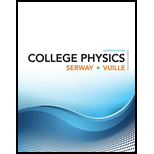
College Physics
11th Edition
ISBN: 9781305952300
Author: Raymond A. Serway, Chris Vuille
Publisher: Cengage Learning
expand_more
expand_more
format_list_bulleted
Concept explainers
Textbook Question
Chapter 30, Problem 17P
Find the energy released in the fusion reaction
Expert Solution & Answer
Want to see the full answer?
Check out a sample textbook solution
Students have asked these similar questions
A
I
squar frame has sides that measure 2.45m when it is at rest.
What is the area of the frame when it moves parellel to one
of
its diagonal with a
m²
speed of 0.86.c as indicated in the figure?
>V.
An astronent travels to a distant star with a speed of 0.44C
relative to Earth. From the austronaut's point of view, the star
is 420 ly from Earth. On the return trip, the astronent travels
speed of 0.76c relative to Earth. What is the distance
covered on the return trip, as measured by the astronant?
your answer in light-years.
with a
Give
ly.
star by spaceship
Sixus is about 9.00 ly from Earth. To preach the star
in
15.04 (ship time), how fast must you travel?
C.
Chapter 30 Solutions
College Physics
Ch. 30.6 - Prob. 30.1QQCh. 30.6 - Prob. 30.2QQCh. 30 - Prob. 1CQCh. 30 - Prob. 2CQCh. 30 - Prob. 3CQCh. 30 - Prob. 4CQCh. 30 - Prob. 5CQCh. 30 - Prob. 6CQCh. 30 - Prob. 7CQCh. 30 - Prob. 8CQ
Ch. 30 - Prob. 9CQCh. 30 - Prob. 10CQCh. 30 - Prob. 11CQCh. 30 - Prob. 12CQCh. 30 - Prob. 1PCh. 30 - Prob. 2PCh. 30 - Prob. 3PCh. 30 - Prob. 4PCh. 30 - Prob. 5PCh. 30 - Prob. 6PCh. 30 - Prob. 7PCh. 30 - Prob. 8PCh. 30 - Prob. 9PCh. 30 - Prob. 10PCh. 30 - Prob. 11PCh. 30 - Prob. 12PCh. 30 - Prob. 13PCh. 30 - Prob. 14PCh. 30 - Prob. 15PCh. 30 - Find the energy released in the fusion reaction...Ch. 30 - Find the energy released in the fusion reaction...Ch. 30 - Prob. 18PCh. 30 - Prob. 19PCh. 30 - Prob. 20PCh. 30 - Prob. 21PCh. 30 - Prob. 22PCh. 30 - Prob. 23PCh. 30 - Prob. 24PCh. 30 - Prob. 25PCh. 30 - Prob. 26PCh. 30 - Prob. 27PCh. 30 - Prob. 28PCh. 30 - Prob. 29PCh. 30 - Prob. 30PCh. 30 - Prob. 31PCh. 30 - Prob. 32PCh. 30 - Prob. 33PCh. 30 - Prob. 34PCh. 30 - Prob. 35PCh. 30 - Prob. 36PCh. 30 - Prob. 37APCh. 30 - Prob. 38APCh. 30 - Prob. 39APCh. 30 - Prob. 40APCh. 30 - Prob. 41APCh. 30 - Prob. 42APCh. 30 - Prob. 43APCh. 30 - Prob. 44APCh. 30 - Prob. 45APCh. 30 - Prob. 46APCh. 30 - Prob. 47APCh. 30 - Prob. 48APCh. 30 - Prob. 49APCh. 30 - Prob. 50AP
Knowledge Booster
Learn more about
Need a deep-dive on the concept behind this application? Look no further. Learn more about this topic, physics and related others by exploring similar questions and additional content below.Similar questions
- (a) For a spherical capacitor with inner radius a and outer radius b, we have the following for the capacitance. ab C = k₂(b- a) 0.0695 m 0.145 m (8.99 × 10º N · m²/c²)( [0.145 m- 0.0695 m × 10-11 F = PF IIarrow_forwardA pendulum bob A (0.5 kg) is given an initialspeed of vA = 4 m/s when the chord ishorizontal. It then hits a stationary block B (1kg) which then slides to a maximum distanced before it stops. Determine the value of d.The coefficient of static friction between theblock and the plane is μk = 0.2. The coefficientof restitution between A and B is e = 0.8.Ans: d=1.0034 marrow_forwardFigure 29-43 Problem 12. ••13 In Fig. 29-44, point P₁ is at distance R = 13.1 cm on the perpendicular bisector of a straight wire of length L = 18.0 cm carrying current i = 58.2 mA. (Note that the wire is not long.) What is the magnitude of the magnetic field at P₁ due to i? P2° R R Larrow_forward
- Checkpoint 1 The figure shows the current i in a single-loop circuit with a battery B and a resistance R (and wires of neg- ligible resistance). (a) Should the emf arrow at B be drawn pointing leftward or rightward? At points a, B C R b, and c, rank (b) the magnitude of the current, (c) the electric potential, and (d) the electric potential energy of the charge carriers, greatest first.arrow_forwardPls help ASAParrow_forwardPls help asaparrow_forward
arrow_back_ios
SEE MORE QUESTIONS
arrow_forward_ios
Recommended textbooks for you
 Principles of Physics: A Calculus-Based TextPhysicsISBN:9781133104261Author:Raymond A. Serway, John W. JewettPublisher:Cengage Learning
Principles of Physics: A Calculus-Based TextPhysicsISBN:9781133104261Author:Raymond A. Serway, John W. JewettPublisher:Cengage Learning Modern PhysicsPhysicsISBN:9781111794378Author:Raymond A. Serway, Clement J. Moses, Curt A. MoyerPublisher:Cengage Learning
Modern PhysicsPhysicsISBN:9781111794378Author:Raymond A. Serway, Clement J. Moses, Curt A. MoyerPublisher:Cengage Learning Physics for Scientists and Engineers with Modern ...PhysicsISBN:9781337553292Author:Raymond A. Serway, John W. JewettPublisher:Cengage Learning
Physics for Scientists and Engineers with Modern ...PhysicsISBN:9781337553292Author:Raymond A. Serway, John W. JewettPublisher:Cengage Learning College PhysicsPhysicsISBN:9781305952300Author:Raymond A. Serway, Chris VuillePublisher:Cengage Learning
College PhysicsPhysicsISBN:9781305952300Author:Raymond A. Serway, Chris VuillePublisher:Cengage Learning College PhysicsPhysicsISBN:9781285737027Author:Raymond A. Serway, Chris VuillePublisher:Cengage Learning
College PhysicsPhysicsISBN:9781285737027Author:Raymond A. Serway, Chris VuillePublisher:Cengage Learning College PhysicsPhysicsISBN:9781938168000Author:Paul Peter Urone, Roger HinrichsPublisher:OpenStax College
College PhysicsPhysicsISBN:9781938168000Author:Paul Peter Urone, Roger HinrichsPublisher:OpenStax College

Principles of Physics: A Calculus-Based Text
Physics
ISBN:9781133104261
Author:Raymond A. Serway, John W. Jewett
Publisher:Cengage Learning

Modern Physics
Physics
ISBN:9781111794378
Author:Raymond A. Serway, Clement J. Moses, Curt A. Moyer
Publisher:Cengage Learning

Physics for Scientists and Engineers with Modern ...
Physics
ISBN:9781337553292
Author:Raymond A. Serway, John W. Jewett
Publisher:Cengage Learning

College Physics
Physics
ISBN:9781305952300
Author:Raymond A. Serway, Chris Vuille
Publisher:Cengage Learning

College Physics
Physics
ISBN:9781285737027
Author:Raymond A. Serway, Chris Vuille
Publisher:Cengage Learning

College Physics
Physics
ISBN:9781938168000
Author:Paul Peter Urone, Roger Hinrichs
Publisher:OpenStax College
Half life | Radioactivity | Physics | FuseSchool; Author: FuseSchool - Global Education;https://www.youtube.com/watch?v=IDkNlU7zKYU;License: Standard YouTube License, CC-BY